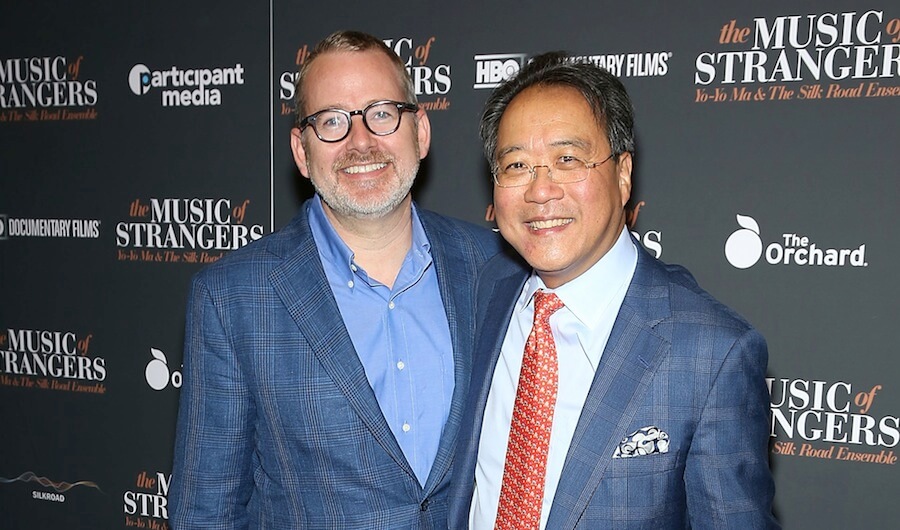“I can be really nasty,” Yo-Yo Ma confesses, with a laugh. This is not what one would expect. He’s one of the world’s most renowned cellists — a child prodigy who, at 60, has long been enshrined as a legend. He has 18 Grammys to his name. But like most serious musicians, he’s far from severe. Ma even starts our chat with a funny story. He was once doing a show in the Berkshires when he decided to prank the conductor. He told him John Kerry was going to staying at the house they were staying at, and asked if he wouldn’t mind staying somewhere else. Kerry, of course, was not in town. One year later, the conductor responded in kind. They were again doing a concert, and he asked Ma if he would play a piece he had written. Ma found it to be extremely difficult, so difficult he wasn’t surprised when the conductor revealed it was a gag — his prank for his prank. He had even gone so far to print up a fake program, on top of devising a fake piece. “Isn’t that awesome?” Ma exclaims with glee.
RELATED: Interview: Daniel Radcliffe on nerding out over Michael Caine on “Now You See Me 2” His warm and amused demeanor doesn’t change even when we talk about something serious. Ma is here, with “20 Feet from Stardom” filmmaker Morgan Neville, to talk about “The Music of Strangers,” a new documentary about the Silk Road Ensemble, the outfit he helped form in 1998, comprised of musicians from all over the world. For both Ma and Neville, the Silk Road Ensemble and the film about them were born out of a need to not just grow as artists, but use their art to change the world.
“How can I use film to make things better? How useful is my work? These are all issues I think about as a filmmaker,” Neville says. “He and I were asking similar questions of ourselves.”
One answer to their questions: Just as the film shows people from all over the world collaborating, it could inspire others to see past superficial differences, particularly at a time when bigotry and isolationism are being preached by a certain presidential candidate. “Given the present environment, I think we’re finding that, in fact, people can collaborate together if they share values — if they have respect for one another, for what the other person does, and the willingness to be generous,” Ma explains. “One thing I’ve thought about as we started to screen the film is how much the work Yo-Yo does is about empathy,” Neville says. “He’s tried to use music to make friends, not strangers, out of people. These foreign cultures that get demonized in our media, he’s tried to make them human. That’s exactly what we do in documentary film — the experience of showing a life that seems totally different but in which you recognize a piece of ourselves in them. Film and music are very much about empathy.” RELATED: Interview: Patrick Wilson won’t do horror — except for “The Conjuring” In a way, Ma understands some people’s reluctance to cross-cultural gaps.
“We’re living in a world that we all acknowledge is changing so quickly, and very few people can keep up with that pace of change,” says Ma. He points to how even something like Uber can be scary: It creates new paradigms or dramatically alters, if not reinvents, industries. “It’s about change and disruption — which is good up to a certain point. But then how do people deal with change? “For some people change makes them very fearful. One reaction to fear is to protect yourself. You form smaller communities, you build walls, you create some kind of distance between you and the other. That actually goes contrary to human nature. The other part of human nature is to open up, to be hospitable. One of the things we were trying to do together was to show that the antidote to fear is generosity. I don’t mean to be saccharine, but the opposite of fear is love.” RELATED: Interview: Paula Patton on becoming a half-orc half-human for “Warcraft” The mission of the Silk Road Ensemble doesn’t end with the movie.
“We’re building bridges, not walls. It’s that simple,” Ma says. “We can bring back walls, but then we’re going to go back to medieval culture, when we have lots of forts and lots of moats — all firewalls, virtual ones or actual ones. But if we choose to be open and communicative, we’ll actually have access to everyone’s strengths. That will make for the strongest communities in the world.”
Yo-Yo Ma thinks we should build bridges, not walls

Getty Images
Follow Matt Prigge on Twitter @mattprigge


















